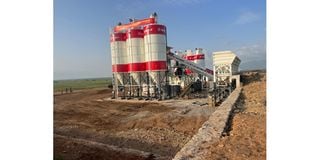Prime
Moroto cement factory under fire over poor worker conditions

Sunbird factory that will manufacture clinker in Nanduget, Moroto District. PHOTO | DAVID AWORI
What you need to know:
- Safety concerns have also been raised. According to Emmanuel Opio, Ugandan workers lack basic protective gear like boots, helmets, and overalls, while their Chinese counterparts are fully equipped.
A $300 million (Shs 1.1 trillion) cement factory under construction in Nanduget, Moroto District, is facing criticism for failing to provide basic sanitation facilities for its workers.
The Sunbird factory, owned by West International Holdings Limited (a subsidiary of Hong Kong-based China West Cement Limited), is intended to manufacture clinker. President Museveni presided over the groundbreaking ceremony on September 13, 2023, highlighting the project's potential to create jobs and boost incomes in the Karamoja sub-region.
However, disturbing reports have emerged regarding the working conditions at the site. Over 30 Ugandan and Chinese workers have taken to open defecation due to lack of latrines on site.
Mr David Amanyire, one of the workers, now says: “For one to answer nature’s call, most employees rush behind a mound of soil because there is no latrine on site, and what has helped is that Nanduget is a sparsely populated area.”
According to Mr Amanyire, the Ugandans take turns to answer nature’s call in the bush before returning to work. “Whereas we have been talking to our Chinese employers about the need to have a pit latrine in place for the workers, they have kept a deaf ear,” he added.
READ: State is undermining suffering workers
Amanyire further complains that Ugandan workers face low wages, a lack of employment contracts, and excessive working hours. They reportedly work from 7:30 am to 7:00 pm with only a one-hour lunch break to find food. Amanyire, who hails from Mbarara District, earns Shs 11,000 per day. After factoring in transportation and food costs, he is barely able to save anything.
“Every morning, I spend Shs6,000 on transport, Shs3,000 to buy food and save Shs2,000,” he said.
Mr Edmond Egwenyu, another worker, says if he works for all the 30 days in a month, his take-home pay is supposed to be Shs330,000; however, he reportedly spends Shs80,000 on rent, Shs180,000 on transport and Shs70,000 on food, leaving him with nothing to save.
Safety concerns have also been raised. According to Emmanuel Opio, Ugandan workers lack basic protective gear like boots, helmets, and overalls, while their Chinese counterparts are fully equipped.
“Whereas the Chinese have full protective gear, none of us (Ugandans) have boots, helmets and overalls; majority of us are working barefooted,” he said, adding that the few Ugandan workers who own helmets pick old ones disposed of by the Chinese.
These issues came to light on Monday during an impromptu visit by officials from the Ministry of Energy and Mineral Development, led by Commissioner of Mines, Ms Agnes Alaba and Commandant of Mineral Police, Mr Julius Tusingwire.
The officials, who have been camping in the Eastern and North-Eastern parts of the country, while consulting on new regulations on artisanal mining, discovered that workers at the plant lack contracts and were underpaid.
A Chinese representative, speaking through an interpreter, justified the low wages by claiming the workers are temporary employees.
When questioned about the lack of toilets, the representative simply gestured towards distant bushes. The representative also attributed the absence of safety gear to a delayed shipment from China.
Ms Alaba urged the investor to improve working conditions by providing fair wages, food, and proper safety equipment for Ugandan workers.
Mr John Baptist Loki, the Member of Parliament for Matheniko County in Moroto District, condemned the exploitation of Ugandan workers and called for such companies to be held accountable.
The Minister for Karamoja Affairs, Mr Peter Lokeris, however, urges leaders to go slow on the investors, saying any mistreatment might make them shift their investment elsewhere, especially to the neighbouring Kenya.
He said: “The investors should be given favourable conditions or else they might shift to Kenya because this marble rock mineral is an extension that stretches across the two borders.”




